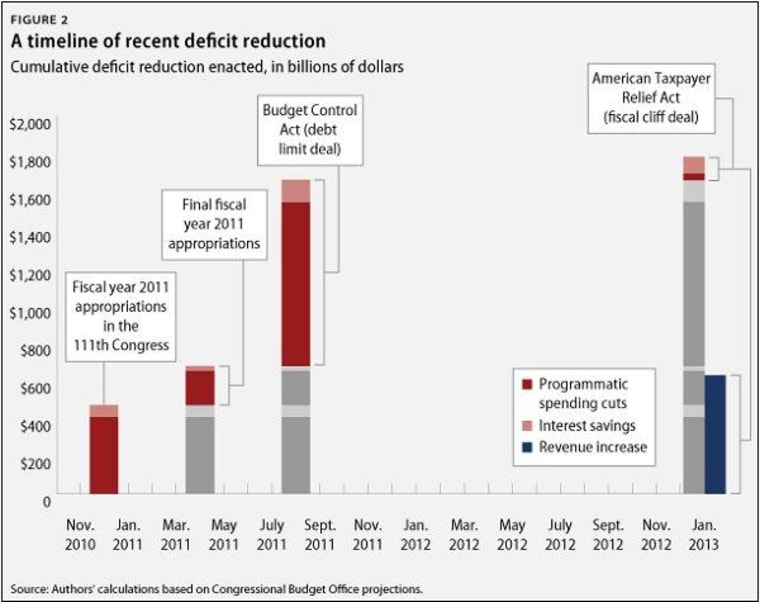When it comes to most of the major political disputes in Washington, congressional Republicans insist Democrats focus on reducing the debt Republicans built up during the Bush/Cheney era. It underpins everything from the budget fight to the debt ceiling to efforts to expand public investments.
What the debate tends to ignore is the debt reduction that's already happened. Michael Linden and Michael Ettlinger reported yesterday that since the start of 2011 fiscal year, President Barack Obama "has signed into law approximately $2.4 trillion of deficit reduction" over the next decade. Their Center for American Progress report came with this terrific chart.
Roughly three-quarters of the deficit reduction has come is in the form of spending cuts, which should further make Republicans happy. And while the $2.4 trillion in savings will be spread out over the next 10 years, it's also worth noting that the deficit has shrunk by $300 billion in Obama's first term, and we're in the midst of the fastest deficit reduction since the end of World War II.
To be sure, it would be my strong preference that policymakers not make this a priority at all. What the nation needs is jobs and economic growth, and the most sensible course of action would be to delay fiscal concerns for a later day. In the wake of a brutal economic collapse, when the need for investment is high and interest rates are low, the responsible thing to do is borrow more, not less.
But even if we put that aside for a moment, the CAP report points to a reality that generally goes overlooked, even by a political establishment that's needlessly obsessed with conservative assumptions about fiscal responsibility.
The conventional wisdom suggests nothing is being done to address a perceived debt "crisis," and that somehow Republicans have the high ground in demanding more and more cuts. It seems spectacularly insane to me to think the GOP has credibility on the subject given that it was Republicans who created the budget shortfall in the first place, but establishment assumptions are hard to shake.
But that's what makes the Linden/Ettlinger report so worthwhile: something is being done, whether this deserves to be a priority or not. Obama has already approved $2.4 trillion in debt reduction. If we include the savings from sequestration, which still need to be negotiated, it would boost the total to $3.6 trillion in debt reduction over the next decade. If we include the savings from the Affordable Care Act, we're looking at roughly $3.8 trillion in debt reduction over the next decade.
That's awfully close to Grand-Bargain-style debt reduction, without actually striking a Grand Bargain.
What's more, let's also not forget cost-saving measures Obama proposed -- cap and trade, Dream Act -- and the GOP killed.
DC assumptions notwithstanding, those who are eager to see Washington push the budget closer to balance should be thrilled by the progress of the last few years.
Postscript: Just as an aside, let's also take a moment to compare administrations. Obama, in just the last two years, has accepted $2.4 trillion in debt reduction through multiple proposals. How many debt-reduction proposals did Republicans approve during the Bush/Cheney era? None. Even when there was a Republican-led House, Republican-led Senate, and Republican-led White House? Yep, even then.
